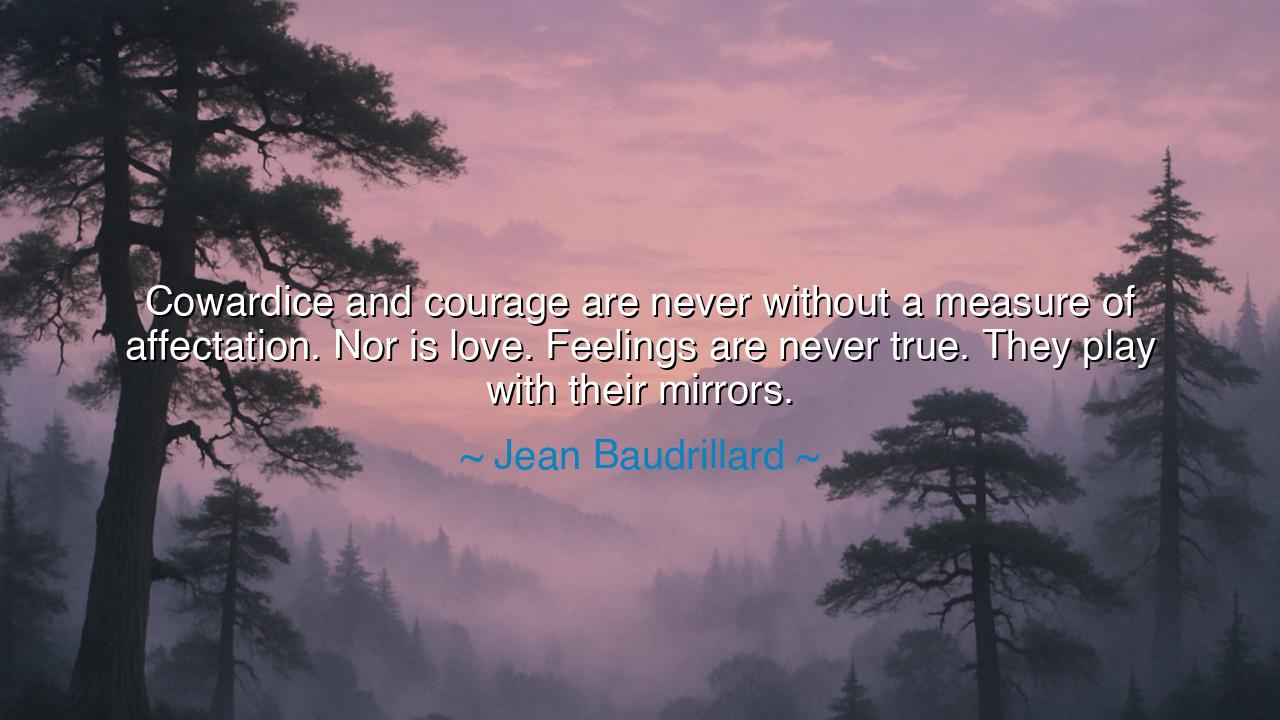
Cowardice and courage are never without a measure of affectation.
Cowardice and courage are never without a measure of affectation. Nor is love. Feelings are never true. They play with their mirrors.






"Cowardice and courage are never without a measure of affectation. Nor is love. Feelings are never true. They play with their mirrors." — Jean Baudrillard
Thus spoke Jean Baudrillard, the philosopher of illusions, who gazed upon the modern soul and saw not truth, but reflection. In this cryptic and haunting saying, he reminds us that the emotions we hold dearest — courage, cowardice, love — are not pure forces that rise untainted from the heart, but shapes distorted by the mirrors of self-perception. Every feeling, he tells us, carries a trace of performance. Even when we believe ourselves most sincere, we are watching ourselves feel, measuring our passion against the idea of what it should be. Our emotions, like actors, do not simply exist — they play their parts beneath the gaze of the world, and beneath our own.
When Baudrillard writes that “feelings are never true,” he does not mean they are false in the sense of deceit, but that they are always mediated — filtered through consciousness, language, culture, and desire. To feel courage is also to want to appear brave, to oneself or others. To feel love is to sense both tenderness and the image of tenderness we believe we should display. Even cowardice, in its self-awareness, is tinged with the shame of its reflection — it knows it is cowardly, and thus becomes a kind of inverted performance. Our emotions, then, do not live freely; they "play with their mirrors", endlessly reflected between our inner truth and the world’s expectation.
Consider the soldier who stands before battle. In the heart, fear and courage wrestle. He raises his sword not only against the enemy, but against his own reflection — the image of the coward he refuses to be. His bravery is real, yes, but it is also shaped by the invisible audience of comrades, ancestors, gods, and self. It is both action and appearance, strength and symbol. Baudrillard’s insight is that no feeling exists in isolation from its mirror — that every emotion carries within it a trace of how it wishes to be seen. The same is true of love: we love not only another, but also the image of ourselves as lovers. We seek not only intimacy, but also the recognition of our devotion. Thus, even in our deepest emotions, the mirror of identity flickers.
This truth, unsettling though it may be, is not new. The ancients too knew that human passion is never pure. Plato, in his dialogues, spoke of love as both divine madness and shadowed imitation — the soul yearning for beauty through imperfect reflection. Marcus Aurelius warned that courage unexamined is but pride in disguise. Even the saints, who sought pure devotion, confessed that their love of God was tinged with the vanity of seeking holiness. So it has ever been: the human heart, though capable of greatness, cannot escape the gaze of its own mirror.
Yet Baudrillard does not leave us in despair. His words are not a condemnation of emotion, but a call to awareness. To see the mirror is to begin to understand the truth behind it. If our feelings are touched by performance, then wisdom lies not in denying this, but in recognizing it — in learning to discern where sincerity ends and affectation begins. The courageous man is not one who acts without fear of seeming afraid, but one who understands that even his bravery is partly a creation, and yet chooses to act. The lover is not one who imagines their affection pure, but one who accepts that love is both feeling and image — and still loves deeply, despite its imperfection.
We can find a living parable of this in Eleanor Roosevelt, who once said, “You gain strength, courage, and confidence by every experience in which you really stop to look fear in the face.” She knew that courage is never absolute, that fear and performance coexist. As First Lady, she stood before hostile crowds, trembling, but spoke nonetheless. Her courage was not the absence of fear, but the transformation of it into purpose — a performance that, over time, became truth. Thus, even when emotion begins as affectation, the act of living it can make it real.
So, my listener, take this teaching into your heart: do not despair when you see your feelings reflected in the mirror. Courage, love, fear, and compassion are not less noble because they are imperfect; they are human because they are mirrored. Strive not for purity of feeling, which belongs to angels, but for authenticity of awareness, which belongs to the wise. When you act bravely, know that part of you wishes to be brave; when you love, know that part of you wishes to be seen loving — and forgive this vanity, for it is the price of being human.
For in the end, as Baudrillard teaches, truth does not live outside the mirror, but within it. To see your reflection clearly, to accept the illusions and still choose sincerity — this is the triumph of the conscious soul. Walk, then, with courage and humility, not to destroy your mirrors, but to look into them unafraid. For the heart that dares to know itself, even in its contradictions, is the heart that is truly free.






AAdministratorAdministrator
Welcome, honored guests. Please leave a comment, we will respond soon